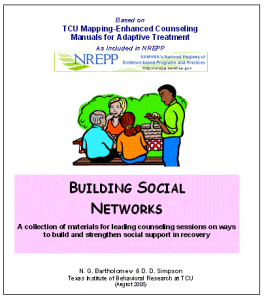
About this intervention
TIC-Social Networks focuses on qualities clients can look for in friends and family who may aid them in achieving their recovery goals. Oftentimes changes in social networks are essential in the recovery process. Upon return to the community, client recovery may be jeopardized if family members or long-time friends are still entangled in a drug-using lifestyle. This intervention walks participants through the steps of taking a peer inventory, making new friends who are drug free, and integrating lifestyle strategies for dealing with old friends and family members who use drugs. The aspects of getting involved in a support group and finding a sponsor also are covered. The 4 sections include Social Networks in Recovery, Support Groups and Your Recovery, When Other Families Use, Mapping Worksheets, and Links of Interest. This intervention is a collection of modular applications for leading counseling sessions on ways to build and strengthen social support in recovery.
Modular applications in this intervention include:
- Social Networks in Recovery is part of the Straight Ahead: Transition Skills for Recovery intervention developed at TCU. This session features
a leader’s script, with notes, worksheets, and handouts for leading a solution-focused or strengths-based discussion of choosing a supportive network of friends. Participants are invited to think about what qualities they look for in friends who will help them stay true to their recovery goals. Materials for a “mini-lecture” highlight considerations for a strong network. - Support Groups and Your Recovery is part of the Straight Ahead: Transition Skills for Recovery manual developed at TCU. This session features a leader’s script, with notes, worksheets, and handouts for leading an open discussion of deciding on and joining a recovery-centered support group. Participants are invited to challenge myths about 12-Step groups and to think about what they need from a support group and what they have to offer to others. Materials for a “mini-lecture” highlight strategies for finding the right group, asking for sponsorship, and checking out alternative groups.
- When Other Family Members Use provides worksheets and group leader instruction for facilitating a session on ways to deal with family members who may jeopardize recovery, including helping participants become more aware of family dynamics and potential triggers. Taken from
a core set of materials developed by Matrix, Inc. (at UCLA), and adapted by NDRI, the intervention features an informational worksheet for participants with questions designed to encourage discussions about difficult family situations and ways to handle them successfully. - These Mapping Worksheets were selected from the intervention TCU Guide Maps: A Resource for Counselors because of their specific focus on social support, 12-Step involvement, and dealing with people who don’t support recovery. Each mapping worksheet follows a “fill in the blank” format to encourage participants to consider various cognitive aspects of seeking social support. Once participants complete a worksheet, group discussions and commentary on the qualities of supportive friends, handling problems, and how to seek a 12-Step sponsor can be explored.
- Social Network Resources— Links of interest.
The Building Social Networks intervention may be freely used for personal, educational, research, and/or information purposes only. Permission is hereby granted to reproduce and distribute copies of content material (except reprinted passages from copyrighted sources) for nonprofit educational and nonprofit library purposes, provided that copies are distributed at or below costs and that credit for author and source are included on each copy.
No part of any material may be copied, downloaded, stored in a retrieval system, or redistributed for any commercial purpose without the expressed written permission of Texas Christian University.
Recommended Citation: Bartholomew, N. G., & Simpson, D. D. (2005). Building social networks. Fort Worth: Texas Christian University, Institute of Behavioral Research. Available: the IBR Web site: www.ibr.tcu.edu